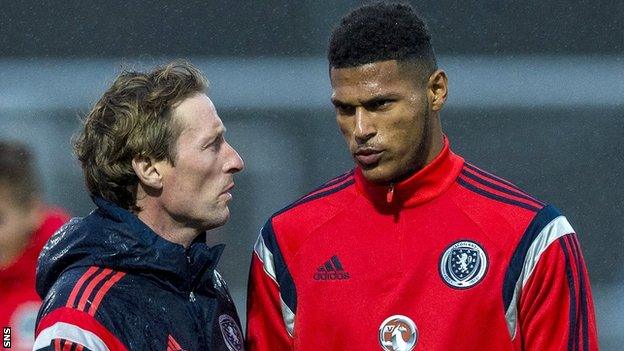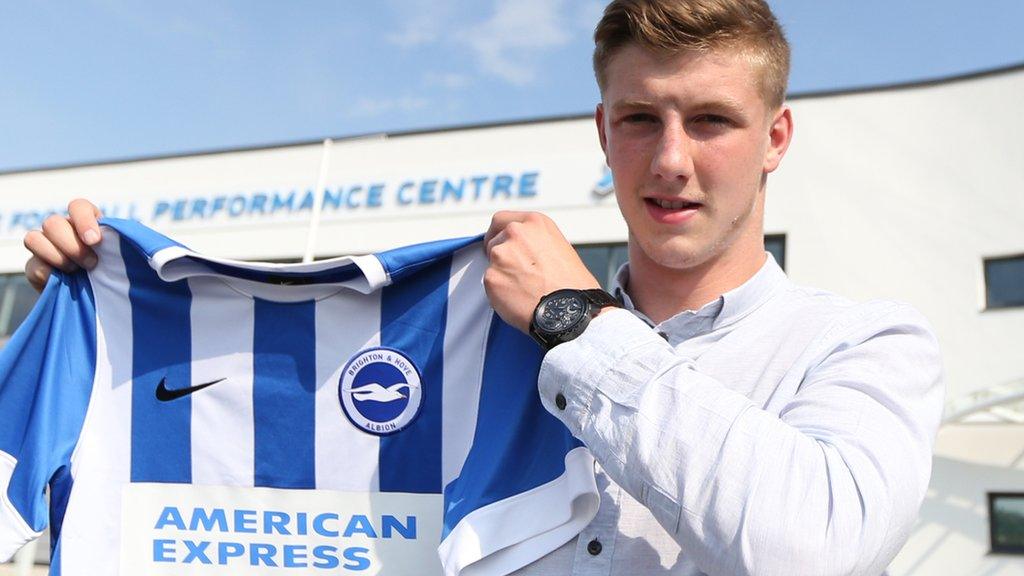Scottish youth football: Green shoots or firing blanks?
- Published

Scot Gemmill (left) thinks Scottish talent is coming through
Scotland's absence from the European Championship finals has provoked the wider question about the quality of Scottish players.
Five years have passed since the Scottish Football Association drew up its performance strategy. Last season, no club that finished in the top half of the English Premier League contained a Scottish international.
In the Scottish Premiership, five clubs finished the campaign with less than half of the players who appeared for them being Scottish. Only St Johnstone reached the informal target of 75% of their players being Scottish, while, of the 25 who played for Inverness Caledonian Thistle last season, only five were Scottish.
So in what state is youth development in Scotland and is the Club Academy Scotland structure devised by Mark Wotte after he was appointed performance director in 2011 working?
BBC Radio Scotland's Sportsound brought together Willie Miller, former Aberdeen director of football, Alistair Gray, who the SFA consulted on the performance strategy and who now chairs a committee of club representatives reviewing Club Academy Scotland, Scotland Under-17 coach, Scot Gemmill, and Tommy Wilson, the former Rangers youth coach and now academy director of Major League Soccer club Philadelphia Union, to discuss the issue.
Is the system working?
Willie Miller: "We're not seeing any signs of [progress] and we're five years into it. I've been part of it, I set up the performance school in Aberdeen, I understand the financial restrictions that clubs work under in trying to fund their development programme. We thought Mark Wotte was going to be a long-term project, but he left after three years, which was really disappointing."
Alistair Gray: "The performance schools have only been performing for three years, so the players will be coming towards under-16 now. When we looked in 2011, 60% of all those capped at under-17/under-19 level for Scotland within five years were not playing or were playing junior football. That number has reduced, so one would hope that we're not throwing out as much talent as we used to throw out. There are now 31 academies, when there are 50-odd in Germany. The key thing is to reduce the number of academies - there are 2,500 players in the Club Academy Scotland system - and that number has to reduce and more has to be done with the [best] players. The facilities are much better now. There's no magic in this, it's about the systematic development of young people and giving them game time in a competitive situation.
"There's no question in the top academies, the practices are extremely good. The style of play is better amongst the young teams, they're building up from the back, pass completion is better. But, between 17 and 21, youngsters are not getting the quality of competitive games despite the positive changes that have been made. Playing a competitive game is the only way you improve.

At 19, Greg Kiltie is a regular in the Kilmarnock midfield
"The Scottish FA have enabled development loans to take place in the last couple of years that are now making a difference. Clubs are trusting each other, there are more players going out on loan. The tragic thing is that the players who are retained by their clubs get fewer games than the players who play for another club.
"The last three of four years have been the worst economic positions for Scottish club. The working group I'm chairing now is made up of clubs and they're committing very much more to some of the performance areas that were identified back in 2011. They really didn't have the appetite or the resources to do so over the last few years."
Scot Gemmill: "I really believe the players have got good potential and their results are suggesting that. That's across the age groups. If you look at this year's under-19 squad, [Ryan] Hardie was playing first-team football, [Greg] Kiltie's playing first-team football, [Aidan] Nesbitt, Kyle Cameron was on loan at York City, Jack Breslin was on loan. I believe that [they will play in the top half of EPL], why not? These players beat Mexico 3-1. They have a different mentality, a different attitude, they have more game intelligence; the work that's going on at the clubs is working."
Scots playing in the Premiership | |||
|---|---|---|---|
Total players used | Scots | % | |
Aberdeen | 31 | 17 | 55 |
Celtic | 36 | 16 | 44 |
Dundee | 30 | 17 | 57 |
Dundee United | 40 | 18 | 45 |
Hamilton Academical | 29 | 14 | 48 |
Heart of Midlothian | 30 | 17 | 57 |
Inverness Caledonian Thistle | 25 | 5 | 20 |
Kilmarnock | 34 | 21 | 62 |
Motherwell | 27 | 13 | 48 |
Partick Thistle | 29 | 19 | 66 |
Ross County | 26 | 16 | 62 |
St Johnstone | 28 | 21 | 75 |
Total | 365 | 194 | 53 |
Culture of youth development
Willie Miller: "Targets are really important, if you can get clubs to buy in. I don't think it's the manager, the club employs the manager, so if you're a board of directors and you have a policy of one [academy graduate into the first-team squad] a season into your squad then you tell the manager that.
"They've got loads at Aberdeen. You're approaching 50% that have come through the academy, not on the park but into the squad. The bench is full of youngsters. Now maybe the manager wants a more experienced bench and I can understand his thinking behind that. You've also got problems with other teams poaching your players as well, at 16. [Jack] Grimmer, [Fraser] Fyvie, Ryan Fraser - there's three players that could have been in the first-team."
Alistair Gray: "It's the short-term aim of the manager to get a quick fix to save their job over the course of the season. The good clubs that are doing [youth development] have a much more integrated system. The first-team manager is at one with the academy director, working together to produce more, better young players.

Aberdeen lost winger Ryan Fraser, who has been on loan with Ipswich, to Bournemouth
"The other thing the Scottish FA has done in recent years is focus the resources in terms of the amount of money they're giving clubs. They've got some performance outcomes that include the number of 18-21 year old players in the first-team and also the players who have come through to international squads and it's not an insignificant amount. The key is not to spread this money, £2.5m, across 31 academies and 2,500 young people and focus it much more."
Tommy Wilson: "Our overall budget [at Philadelphia Union] is more than I had at Rangers. We have more full-time coaches in our academy. We have our own school, we have 14 full-time staff, so we can double the training units that I was used to in Glasgow. Our young players train 10 times a week. Because it's part of a school, it's a much more holistic approach and we have full-time sports psychologists and nutritionists. If you can imagine a high-performance sports school attached to a football club academy, that's the route we're going down. I have some targets to try to get some players into the first-team, but there's not a directive. There's an open dialogue between myself, the manager and the sporting director."
How to progress
Alistair Gray: "There are 50 full-time coaches in the current Club Academy Scotland system; it could be more. There are 200 part-time coaches, but there's no sense of community amongst these coaches. In Germany, post-2000, after they messed up in the European Championships, one of the biggest things they did was double the number of full-time coaches, so there was a career for the coaches. [In Scotland] someone who is a plumber during the day, and they [coach] during the evening or at the weekends, they can't take the time off to do formal coaching qualifications. Something has to be done in the area of coaching so that profession is valued. Are we identifying the future Scot Gemmills? I know of one Premiership club that is putting one of their youth coaches out to manage a League Two club next year. That's a very positive sign, a bit like a loan.
"The [SFA] coaching courses are well regarded and endorsed by Uefa, but once someone has their badge, where do they go? A large number of them aren't coaching at a level where they're able to deliver the benefit of the coaching they've had."

Midfielder Liam Burt has made his Rangers debut at the age of 17
Willie Miller: "The SFA charge for coaching courses. Why not drop that if you're attached to a club? Scottish football can't afford to employ coaches at development level. Celtic can and Rangers could. Inverness Caley Thistle can't afford a development programme let alone employ someone to manage that programme. With Aberdeen, I had two centres, one in Edinburgh and one in Dundee, that I had to close because we couldn't afford it and we had only one full-time coach. I don't think we can compare ourselves with Germany, with a population of 80m people and funds coming out their ears. We should be looking at Iceland."
Scot Gemmill: "Everybody's keen to learn from [Iceland], but our under-17s beat Iceland three or four months ago. Liam Burt scored the winning goal and he made his debut for Rangers recently. There are good players coming through."
Tommy Wilson: "We have produced a number of top coaches and managers [through the SFA's coaching courses] and not produced top players. The only pathway for that top coach is to become the first-team manager to make a salary that is sufficient to support his family. We haven't professionalised youth coaching enough. We've not invested enough in our young players."
Alistair Gray: "There are some good things going on and we're learning from the first four years of the programme and making a small number of changes that will make a significant impact. It will be a pragmatic but impactful series of recommendations that come out in the next few months."
- Published14 June 2016

- Published14 June 2016

- Published14 June 2016
